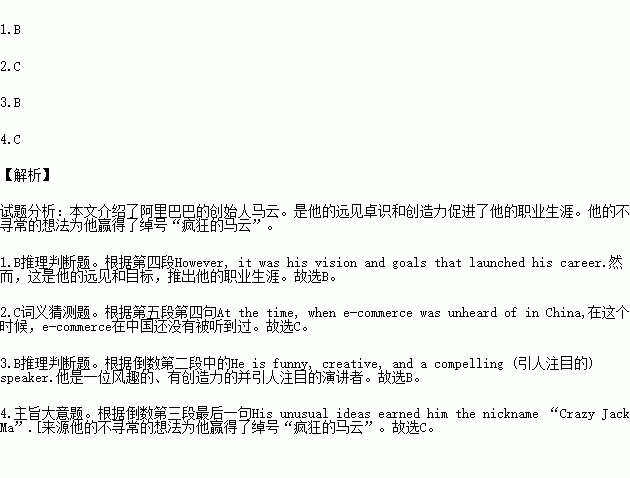题目内容
In New York, Ma Yun witnessed the Alibaba Group opening on the New York stock exchange with the largest initial public offering (IPO,新股发行) in American history. “Alibaba, the world’s largest Internet commerce company makes China equal to the US in the rapidly increasing global competition for technological innovation (创新) and economic transformation ” commented the South China Morning Post.
It has also made Ma China’s richest man with a fortune of around $25 billion (153 billion yuan), reported Reuters.
It’s reported that Ma’s rags-to-riches journey is just as spectacular as his Internet Empire. Ma failed the national college entrance exams twice before he was finally in Hangzhou Normal University on his third attempt and failed in finding a suitable job several times. Also, Mr Ma is a big believer in perseverance, which was proved in his English study experience.
However, it was his vision and goals that launched his career.
During a short trip to the US as an interpreter in 1995, Ma first experienced the Internet. He believed in the Internet’s business potential when few other Chinese people did. He started Alibaba in his Hangzhou apartment, with 17 friends and $60,000 of funds. At the time, when e-commerce was unheard of in China, “I called myself a blind man riding on the back of blind tigers,” he once said, according to The Guardian. His unusual ideas earned him the nickname “Crazy Jack Ma”.
Indeed, Ma is different. Although he is very thin and about 160cm tall, “Ma is yet animated and forceful,” said The Guardian. “He is funny, creative, and a compelling (引人注目的) speaker.
Ma told Time magazine that he was “old for the Internet”. He started to slow down and looked around. According to The Wall Street Journal, Ma “plans to open a tai chi club with the actor Jet Li, build an entrepreneur (企业家) university in Hangzhou and continue to work on several environmental projects.”
1.What made him into e-commerce industry?
A. His English learning experience.
B. His foresight and ambitions.
C. His belief in perseverance.
D. His 17 friends and $60,000 funds.
2.What does the underlined sentence in Paragraph 5 mean?
A. Ma is a blind man riding on a blind tiger.
B. Ma had no confidence in his business future.
C. Ma knew little about e-commerce.
D. Ma had not enough money at that time.
3.What’s the personality of Ma Yun according to the passage?
A. Funny and competitive.
B. Determined and creative.
C. Rich and different.
D. Attractive and believable.
4.What’s the best title of the passage?
A. The Development of Alibaba Group
B. Ma Yun’s Personal Life
C. Ma Yun’s Crazy Success
D. E-commerce in China

